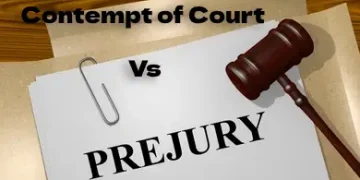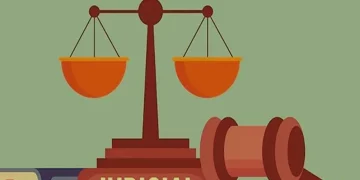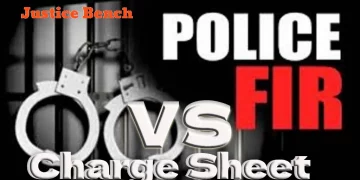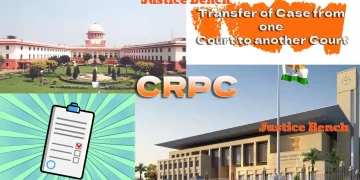The primary objective of the Code of Criminal Procedure, 1973, is to ensure the effective administration of justice. It delineates a procedural code that both the executive and the judiciary must adhere to expedite the resolution of criminal cases. Section 340 of the Code is instrumental in fulfilling this purpose by outlining the procedure for dealing with a specific list of offenses that impede the proper administration of justice, as enumerated in Section 195.
Section 195 of the CrPC outlines mandatory prerequisites that must be fulfilled before a court can take cognizance of the specified offenses. Subsequently, Section 340 of the CrPC delineates the procedure to be followed when the court seeks to initiate prosecution for offenses committed during or about a proceeding before itself, particularly focusing on offenses specified under Section 195(1)(b).
Under Section 195(1)(a), if an offense is committed against a public servant, prior sanction for prosecution is deemed necessary. On the other hand, Section 195(1)(b) mandates that when an offense is related to a court, the sanction of the court must be obtained before proceeding against the offender. This dual-layered approach ensures that legal proceedings are conducted with the requisite authorization, maintaining the integrity of the judicial process.
Objective
The purpose of Section 340 of the Code of Criminal Procedure (CrPC) is to determine whether any offense that hampers the administration of justice has occurred in connection to any proceedings before a court or any document presented or provided as evidence in court. It also aims to establish whether it is advisable, in the interest of justice, to initiate appropriate action in response to such offenses.
According to the Hon’ble Supreme Court, there are two prerequisites for commencing proceedings under Section 340 of the Code of Criminal Procedure (CrPC):
- Initially, the evidence presented before the Court should indicate a prima facie case warranting a complaint for the investigation of an offense specified in clause (b)(i) of sub-section (1) of Section 195 of the Code of Criminal Procedure.
- Additionally, it is expedient in the interests of justice that an inquiry should be made into the alleged offense.
Stringent measures are imperative to combat the menace of perjury and to hold individuals accountable for making false statements that deceive and mislead the Hon’ble Court. Upholding the integrity and esteem of the judiciary demands decisive action.
In the case of Anil Kumar Goel v. Kushan Chand Kabrar, the Supreme Court clarified the applicability of Section 340, Cr. P. C., stating that Section 195 (1) (b) (ii) of Cr. P. C. is relevant only when an offense under that section is committed, and it pertains to a document submitted as evidence before the Court. In this context, the Court emphasized that the forged document in question was presented in a government office, not a Court. Consequently, Section 340, Cr. P.C. was deemed inapplicable due to its jurisdictional limitations. As a result, the appeal was dismissed, and the Court rejected the appellant’s plea to assess the authenticity of the alleged document and file a complaint if forgery was established.
Section 340 mandates that the Court, intending to initiate legal proceedings, should file a complaint either suo motu or upon receiving an application for the same. However, the section does not impose an obligation on the Court to conduct a preliminary inquiry before commencing prosecution in every instance. The Court is justified in initiating prosecution when it deems it necessary to investigate an offense under Section 195 in the interest of justice.
Case Laws
Jadu Nandan Singh Vs Emperor, 1910
The Calcutta High Court in this case highlighted the importance of a cautious approach that needs to be adopted while setting the criminal law in motion. Section 340 of the Code of Criminal Procedure, 1973 has laid down the procedure for cases that are mentioned under Section 195 of the Code, and therefore this Section sets the criminal law in motion with respect to the offences that affect justice administration.
Chajoo Ram Vs Radhey Shyam, 1971
It is to be noted that when an offence is in relation to a court as under Section 195 (1)(b) of the Code of 1973, the Court’s sanction is to be obtained first. In this case, the Supreme Court of India upheld the decision made in the two previous cases that such a sanction must be granted in cases where the offence of perjury appears to be of a deliberate and conscious nature, and it must be accompanied by a conviction that is reasonable, and likely. By holding this, the top Court wanted to confer the information on other courts that starting a prosecution for perjury too frequently without due caution, and with reliance on doubtful materials would defeat the purpose of a careful prosecution, and cautious approach by the courts while setting the criminal law in motion thereby affecting proper administration of justice.
Any Court, be it Civil, Revenue or Criminal Court, proceeding under Section 195 (1) (b) should first conduct a preliminary inquiry and record a finding. Thereafter, the Court itself should make a complaint in writing to the Magistrate first class having jurisdiction. It must, however, be stated that absence of preliminary inquiry under this section does not per se violate the proceedings where a prima facie case has already been made out in the proceedings in which the offence is alleged to have been committed, or when there is sufficient documentary evidence on record and no oral evidence is called for.
The Court should also see that the prosecution has been undertaken in the interest of justice and not for satisfying the personal grudge of the litigant. The Court ordering for a complaint under this section itself should be of the opinion that the prosecution is expedient in the interests of justice. Where a Court is satisfied that it is expedient in the interest of justice that the offence alleged should be inquired into, it should make the complaint in writing signed by such officer as the Court may appoint, where the Court making complaint is a High Court, and the presiding officer of the Court, in any other case.
Any irregularity in the complaint shall not vitiate the proceedings as it is curable under Section 465 of the Code.
Before proceeding under Section 340, the Court must be satisfied that the party sought to be proceeded against committed the offence intentionally and deliberately.
Priyanka Srivastava & Anr Vs State Of U.P.& Ors, 2015
In the present case, the complaint has concealed and lied on oath that the present matter is currently under the jurisdiction of the women cell and counselling is still pending for xxx.
The complainant has concealed and lied on oath that she refused to attend the hearing of the women cell and even refused to talk settlement as per the directions and discussions of the women helpline and that she had earlier sent a legal notice.
It was observed that the contents of the entire 156 (3) CrPC filed are false and absolutely vague besides being misleading and contemptuous. She has even concealed and lied to the senior police officers that she had in fact given a complaint to the Police station but no action was taken.
It was held that the concealment and false averments on oath by Complainant should not be condoned and it warrants necessary action u/s 195 r/w 340 Cr.P.C. The present application is necessitated on the premise that the Complainant has on oath stated various false deliberately in order to mislead this Hon’ble Court.
It was further held that the Complainant’s conduct in stating all the wrong and false facts and that too falsely is illegal, unjust and unwarranted. The Complainant by making false statements before this Hon’ble Court has made itself liable to be put behind bars attracting heavy offences. The contents of the Complaint are also mind-boggling and full of false and frivolous contents and the Complainant ought to be punished for stating false and frivolous facts and that too on oath and for the reason same the Complainant ought to be prosecuted for the said act to set a deterrent example.
Murray & Company Vs. Ashok Kumar Newatia & Ors.
In this case, the Supreme Court held that “the practice of having false evidence incorporated in an affidavit filed before a court should always be deprecated and we do now record the same. The fact that the defendant has affirmed a false affidavit before this court is rather serious and thereby rendered himself guilty of contempt of this court as noticed hereinbefore.”
Baban Singh And Anr. Vs Jagdish Singh & Ors.
In this case, the Supreme Court held that “swearing falsely when one is bound by oath to state the truth because an affidavit is a declaration made under oath. The definition of the offence of giving false evidence thus applies to the affidavits.”
Dhananjay Sharma Vs State Of Haryana And Ors, 1994
Here the Supreme Court held “we are of the opinion that he is now repentant but he cannot be allowed to go scot-free for the falsehood indulged into by him in this Court and for his attempt to poison the stream of justice. However, Imprisonment for a period of two months for committing contempt of court by filing false affidavits denying the allegations made in the writ petition and the affidavit”
Mehtab Son Of Shri Mohd. Sabir Vs Union Of India
While dismissing the appeal, the court directed the Registrar General to make a complaint to the concerned Metropolitan Magistrate having jurisdiction for making false statements in the affidavit and also take such other steps as are required in law under Section 340(1)(d) &(e) Cr.P.C. The provision of Section 340 of Code of Criminal Procedure, 1973 (Cr.P.C.) provides for a complaint being filed before a concerned Metropolitan Magistrate in case any of the offences as stated in the said section are found to have been committed.
The offences which are mentioned in Section 340 Cr.P.C. are those offences contained in Section 195(1) (b) Cr.P.C. A reference to Section 195(1)(b) shows that it includes the offences of perjury, giving false affidavits etc. which are punishable under Sections 193, 199, 200 and 209 of the Indian Penal Code, 1860 (IPC).
Rajeev Kumar Son Of Lakshman Vs The State Of U.P.
Petitioners filed the petition totally on false averments in order to mislead the Court to obtain a favourable order, they are liable to be tried for committing criminal contempt and are further liable to be dealt with heavy hands.
Metropol India (P) Ltd. Vs Parveen Industries India, 2009
False affirmation of affidavit and the false statement made in the court which also amounts to contempt of this court.
J.Sudarshan Vs Unknown On 17 December, 1996
Giving false information and filing false affidavits would amount to criminal contempt and are liable to be punished for the same.
Chintakrindi Venkateswarlu Vs Head Constable 6th Town Police
A false statement is made before the Court on oath or any act, which causes hindrance in the process of administration of justice, is done, it amounts to criminal contempt. The due process of law cannot be permitted to be slighted nor the majesty of law be made a mockery by such acts or conduct on the part of the parties to the litigation.
Karnataka High Court Advocate General, High Court Of … Vs Chidambara And Anr, 2003
The High Court in the aforesaid judgment had also held that any person who makes a false statement on oath would be interfering with the administration of justice.
Shamsher Bahadur Singh @ Nirmal … Vs The State Of Madhya Pradesh
Swearing of false affidavit not only obstructs but also perverts the course of justice. Since the false statement in the affidavits was made deliberately and consciously, it certainly amounted to Contempt of Court.
Mohammod Hussein Kasau Motiwala Vs State Of Maharashtra And Others, 1995
The court found that the facts stated in the petition on oath are fabricated and false. It amounts to abuse of process, criminal contempt of Court and the petitioner who has made a false statement on oath is also liable for the prosecution under the appropriate provision of I.P.C.
Chandra Shashi Vs Anil Kumar Verma, 1995
Immoral acts of perjury, pre-variation and motivated falsehoods were held to be amounting to criminal contempt observing that if such actions were not appropriately dealt with, it would not be possible for any court to administer justice in the true sense and to the satisfaction of those who approach it in the hope that truth would ultimately prevail. It was further held that if recourse to falsehood is taken with oblique motive, the same would definitely hinder, hamper or impede even flow of justice and would prevent the courts from performing their legal duties as they are supposed to do.
Narain Das V. Government Of Madhya Pradesh And Ors.
There can be no doubt that if a wrong or misleading statement is deliberately and wilfully made by a party to litigation with a view to obtain a favourable order, it would prejudice or interfere with the due course of the judicial proceeding, and thus, amount to contempt of court.
The Secretary, Hailakandi Bar Association V. State Of Assam And Anr. Air 1996 Sc 1925
Apex Court held that filing inaccurate documents deliberately, with a view to mislead the Court, amounts to interference with the due course of justice by attempting to obstruct the Court from reaching a correct conclusion, and thus, amounts to contempt of Court
Supreme Court Of India Afzal & Anr. V. State Of Haryana, 1996
The Apex Court held that a false and a misleading statement deliberately and wilfully made by a party to the proceedings to obtain a favourable order, amounts to prejudice or interference with the due course of judicial proceedings, and it will amount to criminal contempt. The Court further held that every party is under a legal obligation to make a truthful statement before the Court, for the reason that causing obstruction in the due course of justice “undermines and obstructs the very flow of the unsoiled stream of justice, which has to be kept clear and pure, and no one can be permitted to take liberties with it by soiling its purity”.
In the instant case, the applicant also refers and relies upon any other argument/fact which may be extended/stated at the time of argument of the present application. Each of the false statements made by complainant on oath to the knowledge of the complainant in as much as complainant made these false statements in complaint / 156 (3) CrPC, in order to mislead and overreach the Hon’ble Court and obtain favorable orders from the Hon’ble Court and in as much played fraud upon the Hon’ble Court and obstruct the administration of justice.
That the false statements have been made by the complainant knowing fully well that the said statements are material for the purpose of making the decision in the case. That perjury committed by the complainant is daring and atrocious.
It was held that the complainant ought to be punished for the offence of perjury. That is the present case the perjury has been deliberate and conscious and the conviction is probable and likely in the light of confessions made by the complainant. That a complainant is a person who has no regard for the truth and is in gross indiscipline and deliberately misleads the Hon’ble Court and therefore it is in the interest of justice to order for the complaint to be filed in the Hon’ble Court of A.C.J.M. against the complainant under section 191, 192, 193 I.P.C.
That Hon’ble High Court in Gurbinder Singh Versus Manjit Kaur, held that:
4. I, therefore, hold the respondent guilty of contempt and a fine of Rs.10,000/- is imposed on her.
In Mukesh Kumar Gupta Vs. Rajneesh Gupta, Ld. ADJ Dr. Kamini Lau held: “Further, no litigant has a right to unlimited drought upon the court time and public money and easy access to justice cannot be used as a licence to file misconceived and frivolous petitions. Suppression and Concealment of material facts is impermissible to a litigant or even as a technique of Advocacy.
In High Court on its own motion Versus Shri Dattatray Narayan Samant, Hon’ble Bombay High Court held:
30. Accordingly, we proceed to pass the following order:
- We hold that respondents/contemners are guilty of having committed criminal contempt within the meaning of Section 2(c)(i) of the Contempt of Courts Act, 1971;
- We punish four months of simple imprisonment with a fine of Rs.2,000/- to each of the contemners. The order of punishment and fine, however, shall remain in abeyance initially for four weeks from today to enable the contemners to file an affidavit of apology and to unconditionally withdraw the offending allegations made by them against the learned Judge and to undertake to observe restraint in future.
Conclusion
A comprehensive understanding of the provisions outlined in Chapter XXVI of the Code of Criminal Procedure, 1973 is essential, as they play a crucial role in eliminating any obstacles that may impede the smooth administration of justice.
In summary, Sections 195 and 340 of the CrPC are designed to safeguard the dignity of the Court and ensure the seamless administration of justice. However, established legal principles dictate that the initiation of prosecution under Section 340 CrPC should serve the broader interest of administering justice, devoid of any motives for personal revenge, vindictiveness, or catering to the interests of private parties.
Moreover, in instances where such proceedings are intended solely for forming an opinion about initiating a formal complaint before the concerned Magistrate, it is reasonable and logical that an individual undergoing such a preliminary inquiry, often referred to as the “would-be accused,” does not possess the right to seek an audience before the Court at this stage. It is evident that such a preliminary inquiry aims not to establish the guilt or innocence of the individual.
Therefore, it cannot be construed as a violation of the right to be heard, indicating no infringement of the principle of Audi alteram partem. The legal entitlement to be heard only arises when a formal complaint is lodged, and the Magistrate summons the individual as an accused to appear before the court.
The case laws discussed in this article provide insights into the provisions of this chapter, allowing readers to grasp the procedural intricacies underlying the concepts within the Code.
Relevant Judgments:
- Noorali Babul Thanewala v. K.M.M. Shetty, AIR 1990 S.C. 464
- C.P. Singh v. State of Rajasthan, 1993 Cr.L.J. 125.
- Amar Bahadurising v. P.D. Wasnik and others. 1994, Cri.L.J 1359
- VC Shukla v. Tamil Nadu Olympic Association. 1991 Cri.L.J. 2722
- SP Mishra Vs. Authorised Controller SMLN Inter College, Basupur, District Ghazipur & Ors., 1996 All.L.J. 119;
- Dhananjay Sharma Vs. State of Haryana, 1995 (3) SCC 757;
- Gulshan Kumar Vs. The Collector, Ghaziabad., AIR 1994 All. 243; 8.Dr. Khetpal Singh Vs. State of U.P. & Ors., 2009 (76) ALR 320)
- Advocate General, State of Bihar vs. M/s Madhya Pradesh Khair Industries and another, AIR 1980 SC 946
- In Afzal and another vs. State of Haryana and ors(1996) 7 SCC 397
- Mohan Singh vs. Late Amar Singh (1998) 6 SCC 686
- Naraindas Vs. Govt of MP & others, AIR 1974 SC 1252
For More articles click here

















